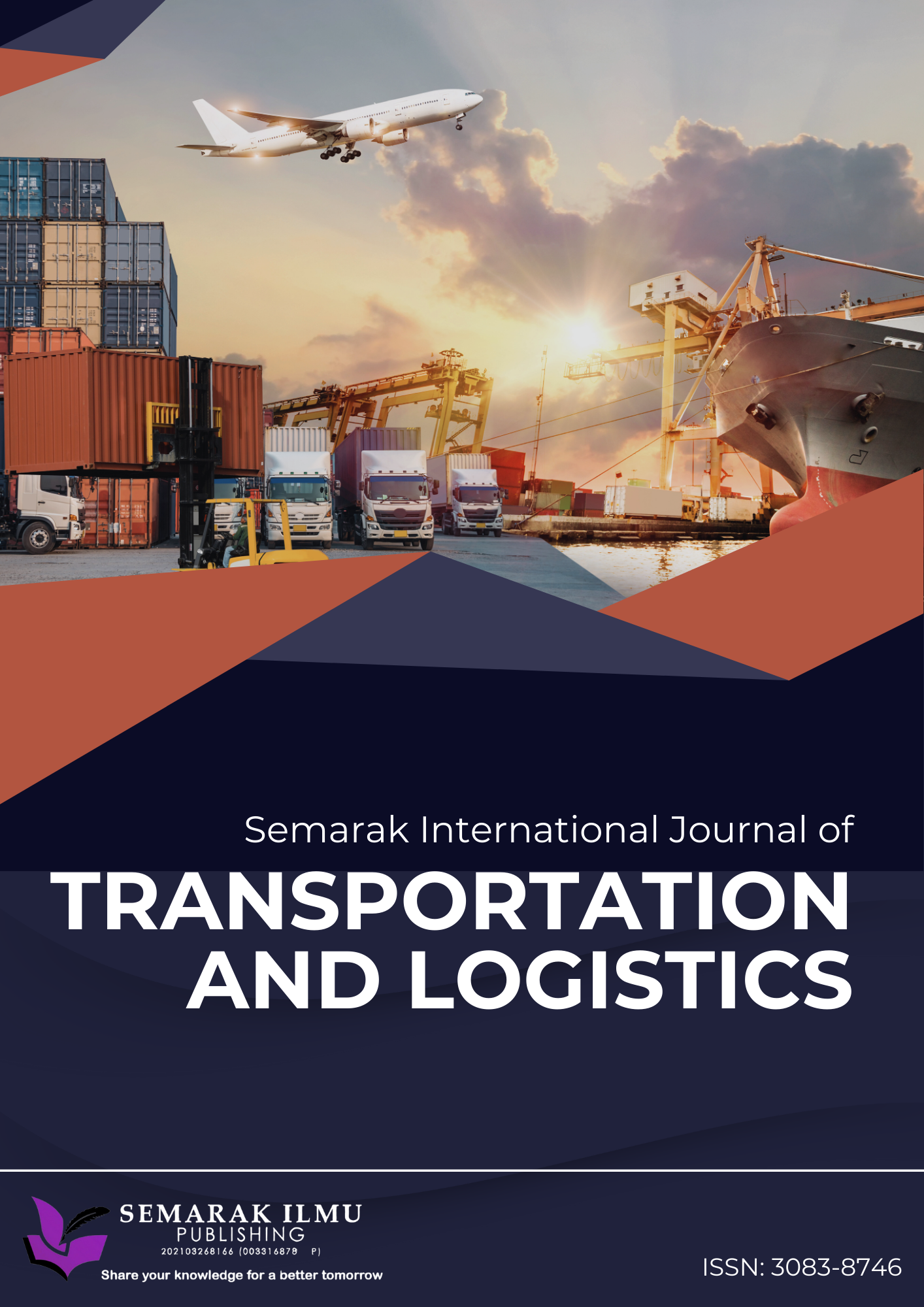Assessing the Relational Benefits of Logistics Services (LSP) as Perceived by Automotive Manufacturers in Klang Valley using Structural Equation Modelling (SEM)
DOI:
https://doi.org/10.37934/sijtl.1.1.3044Keywords:
Logistics service providers, automotive manufacturers in klang valley, loyalty benefitsAbstract
The increasing significance of logistics activities that extend across the boundaries of supply chain firms highlights the importance of managing relationships within the supply chain. Many automotive companies nowadays find outsourcing logistics functions to be a compelling choice. In the current landscape, a growing number of automotive companies are opting for outsourcing logistics functions. This shift is driven by the desire to attain strategic advantages in logistics with the ultimate goal of cost reduction. As the Malaysian automotive industry continues to grow annually, it is increasingly crucial for car manufacturers and assemblers in Malaysia to establish successful relationships with Logistics Service Providers (LSPs). In alignment with the current marketing concept that prioritizes relational benefits and insights derived from the supply chain management literature concerning consumer satisfaction, this research evaluates logistics service performance perceived by manufacturers. The validation process involves distributing questionnaires to 74 car manufacturing companies in Klang Valley area, achieving a response rate of 52.7%. In this study, the automotive companies are chosen to examine the relative importance of the three identified benefits, Special Treatment, Value Added (VAL), and Collaborative Benefits (COL) using Structural Equation Modelling (SEM) and a new benefit, Loyalty Benefit (LOY), was added to the framework. The contribution of this study includes providing new theoretical insights into the benefits–satisfaction–loyalty triad as applied by manufacturers and logistics service providers (LSPs). It also provides valuable perspectives on how to strategically evaluate logistics providers, aiming to transform a logistics firm from a tactical service provider into a closely integrated strategic partner
Downloads
References
Shahril. 2020. National Automotive Policy 2020: Gearing Towards Connected Mobility. MIDA. Accessed January 29, 2024.
Ng, Eileen. "Malaysia seeks to revive car industry with new policy." 26 May 2009 (2009).
Malaysian Automotive Association. 2018. “Press Conference for Market Review for 2018 and Outlook for 2019.” MAA Press Release Report. Accessed.
Malaysian Automotive Association. 2019. “Press Conference for Market Review for 2018 and Outlook for 2020.” MAA Press Release Report. Accessed.
Mukhamedjanova, Kamola A. "Concept of supply chain management." Journal of critical reviews 7, no. 2 (2020): 759-766. http://dx.doi.org/10.31838/jcr.07.02.139
Khan, Syed Abdul Rehman, Zhang Yu, Syed Abdul Rehman Khan, and Zhang Yu. "Introduction to supply chain management." Strategic Supply Chain Management (2019): 1-22. https://doi.org/10.1007/978-3-030-15058-7_1
Colgate, Mark, Margo Buchanan‐Oliver, and Ross Elmsly. "Relationship benefits in an internet environment." Managing service quality: an international journal 15, no. 5 (2005): 426-436. https://doi.org/10.1108/09604520510617310
Tang, Christopher S. "Socially responsible supply chains in emerging markets: Some research opportunities." Journal of operations management 57 (2018): 1-10. https://doi.org/10.1016/j.jom.2018.01.002
Hsiao, Kuo‐Lun, Judy Chuan‐Chuan Lin, Xiang‐Ying Wang, Hsi‐Peng Lu, and Hueiju Yu. "Antecedents and consequences of trust in online product recommendations: An empirical study in social shopping." Online Information Review 34, no. 6 (2010): 935-953. https://doi/org/10.1108/14684521011099414
Cao, Mei, and Qingyu Zhang. "Supply chain collaborative advantage: A firm’s perspective." International Journal of Production Economics 128, no. 1 (2010): 358-367. https://doi.org/10.1016/j.ijpe.2010.07.037
Zhu, Wenwen, Stephen CH Ng, Zhiqiang Wang, and Xiande Zhao. "The role of outsourcing management process in improving the effectiveness of logistics outsourcing." International Journal of Production Economics 188 (2017): 29-40. https://doi.org/10.1016/j.ijpe.2017.03.004
Rushton, Alan, Phil Croucher, and Peter Baker. The handbook of logistics and distribution management: Understanding the supply chain. Kogan Page Publishers, 2022.
Jayaram, Jayanth, and Keah-Choon Tan. "Supply chain integration with third-party logistics providers." International Journal of production economics 125, no. 2 (2010): 262-271. https://doi.org/10.1016/j.ijpe.2010.02.014
Shen, Chien-wen, and Ching-Chih Chou. "Business process re-engineering in the logistics industry: a study of implementation, success factors, and performance." Enterprise Information Systems 4, no. 1 (2010): 61-78. https://doi.org/10.1080/17517570903154567
Kumar, Vikas, and Ogunmola Gabriel Ayodeji. "E-retail factors for customer activation and retention: An empirical study from Indian e-commerce customers." Journal of Retailing and Consumer Services 59 (2021): 102399. https://doi.org/10.1016/j.jretconser.2020.102399
Gwinner, Kevin P., Dwayne D. Gremler, and Mary Jo Bitner. "Relational benefits in services industries: the customer’s perspective." Journal of the academy of marketing science 26 (1998): 101-114. https://doi.org/10.1177/0092070398262002
Hu, Li‐tze, and Peter M. Bentler. "Cutoff criteria for fit indexes in covariance structure analysis: Conventional criteria versus new alternatives." Structural equation modeling: a multidisciplinary journal 6, no. 1 (1999): 1-55. https://doi.org/10.1080/10705519909540118
Zulkifly, Syazwan Syah, and Nur Syifa Mohamad Zahir. "Unveiling the Impact of Transformational Leadership on Safety Performance Measures in Malaysia's SME Sector: A Two-Stage PLS-SEM Analysis." Journal of Advanced Research in Business and Management Studies 31, no. 1 (2023).
Chandren, Thiagu P., Fatimah Salim, Noorlizawati Abd Rahim, Wan Normeza Wan Zakaria, and Siti Hasliah Salleh. "Determinants of Turnover Intention Among Employees: A Case Study of Manufacturing Company." Journal of Advanced Research in Business and Management Studies 25, no. 1 (2021): 26-37.
Li, Feng. "The information content of forward‐looking statements in corporate filings—A naïve Bayesian machine learning approach." Journal of accounting research 48, no. 5 (2010): 1049-1102. https://doi.org/10.1111/j.1475-679X.2010.00382.x
Hatem, Georges, Joe Zeidan, Mathijs Goossens, and Carla Moreira. "Normality testing methods and the importance of skewness and kurtosis in statistical analysis." BAU Journal-Science and Technology 3, no. 2 (2022): 7. https://doi.org/10.54729/KTPE9512
Hair Jr, Joseph F., G. Tomas M. Hult, Christian M. Ringle, Marko Sarstedt, Nicholas P. Danks, and Soumya Ray. Partial least squares structural equation modeling (PLS-SEM) using R: A workbook. Springer Nature, 2021. https://doi.org/10.1007/978-3-030-80519-7
Li, Ling. "Assessing the relational benefits of logistics services perceived by manufacturers in supply chain." International Journal of Production Economics 132, no. 1 (2011): 58-67. https://doi.org/10.1016/j.ijpe.2011.03.006















